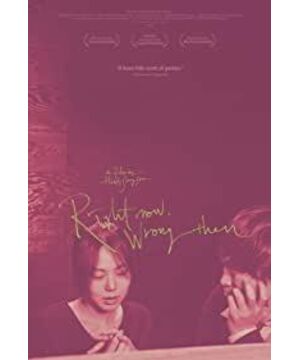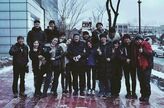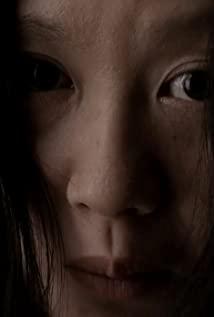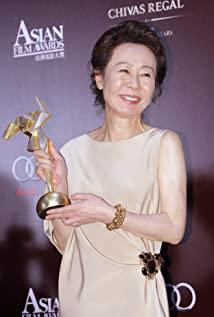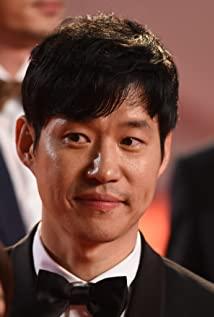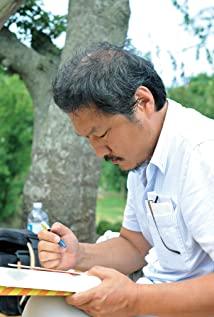Hong Sang-soo: I don't think déjà vu is my formal structure, and... well, in the second part, the director didn't know the girl he met and couldn't say she reminded him of someone or something from the past. But the audience already knew him and her at the beginning of the second part. When I directed Zheng Zaiying, he acted as if he had a strange and intimate connection with her, a strong sense of identification, feeling that he knew her, but had no way of explaining why. If you understand it this way, it makes sense to talk about deja vu.
After the first part is shot, the editing is done and then shown to the actors, so the actors know the plot structure but not their characters in the second part. Perhaps because of that, there's arguably some sort of moral uplift in the second part, and an improved relationship between them. But maybe it's this déjà vu that's keeping everything from going perfect the second time over, because it's a bad feeling.
Comparing the two parts, if I can call them "parts", some elements connect so well that the audience feels like they can explain the changes in morality and attitudes of the two parts. But some elements are not like this, the two worlds are very independent. It would be nice if someone could explain the relationship between these two parts. But this will end everything... you know what I mean? This makes sense, but it still feels like the two parts are very independent.
If you believe that these two worlds exist at the same time, once you find the connection between them, the two worlds will disappear. Once we figure out the relationship between these two worlds, they come to an end. Fortunately, figuring out how they are related is not easy. If the world has infinite possibilities, all questions will be alive, like eternal echoes.
Even if the two parts are parallel worlds, the sequence of the films is important, with the second part following the first. If you're shooting a video for an art gallery, you can show two parts on two screens at the same time, and things can go in parallel.
Even showing like that, you always have to look at one part before the other. Time frames cannot be avoided. It is important to think about the course of things over time.
Now I'm starting a film with almost no preparation, I mean, there are still two things to prepare: the location and the actors. I don't know anything about Suwon at all, maybe I read about it a long time ago that gave me my first impression of this place. Suwon is a cold city, I went there one day, met some people, walked around, and decided to shoot here. For example, I found the sushi restaurant in the movie by accident, the owner is a very good person, I said to him: "I'm Hong Sang-soo, I'm a film director, and I'm going to shoot three three-dimensional movies with my small film team. Week time. The way I work is weird so I don't know the exact time, can you allow me to shoot? Maybe I'll be back two or three times, but I'll let you know as soon as I know the trip." He said, "Ok , but not on weekends." That way, I made a deal with these places, but I didn't know what I was going to do there at the time, I just picked them intuitively.
I believe the first impression of meeting the actor is what starts everything. What interests me is the most important, this is the core: I treat them as ordinary people, and I don't judge the works they are involved in as actors. I often don't know what movies they've been in before. Based on this impression, sometimes I can remember something that happened to me a long time ago, some situation, some predicament or lost memory.
I asked Kim Min-hee if she could work with me during this time. Then I had two main characters and some filming locations. It was still two months away from the plane, and some ideas were starting to emerge, but not fully settled. Three or four days before shooting, I made some important decisions. For example, I would shoot a scene in front of the palace, where the two characters would meet. So I contacted the palace managers and told them we were going to shoot here. I started writing the script for that day very early on the first day, either in the office or directly on the set. I usually start writing scripts at 5 or 6 in the morning, and I write for three hours, sometimes five hours.
I was like everyone else when I made the first three or four films. Later I started rejecting the script, but there was a 20 or so page overview of the whole story, which I used to call "treatment". Even so, it's gotten more and more condensed over the years, and when I did Oak Hee's Movie (2010) it became more casual, with just a few notes left, "treatment" gone.
Kim Min-hee was a model before becoming an actress, a fact cited by her character Yoon Hee-jung in the film. At the end of the second part, she's in the cinema watching Chun-soo Ham's latest film, and we hear the voices from your last work, "Freedom Hill" (2014). Movies may not be based on real people in your life, but there is always a transformation. it is necessary. What's important to you may also be important to your movie...
Imagine that this rectangle is real life. I want to get as close to it as possible. How to do? Use details of my life, things I've experienced, things I've heard from people I know or just met. I always mix different sources of information, it's never about myself, but it looks like something happened, or it looks like it's a story about me, and I love the effect. I realized this when I was 23 when I was writing a script based on a true story. I was so nervous, I couldn't move, I needed distance. In the same way, my film is not a parallel existence to real life, what I want to do is to follow the arrow from the string to real life and stop it at the last moment.
I've worked with completely amateur actors before, and "The Power of Gangwon-do" is that. They are talented and show their true character, but they lack thickness and are weak. For example, the lines I write look natural, but they are actually processed, so they require precision, and amateur actors cannot adapt to this. That's why I work with professional actors: they can be precise and do what I want them to do. But I didn't see them as actors when I first met them.
I always think of the same characters and the same scenes because I'm the same person. But now 20 years of making movies, I'm not the same me anymore. As in the movies, when the story repeats, what stays the same is change.
For example, I don't feel the same about my mother now as I did 20 years ago. But I can use the same elements to show the changes I've experienced. Sometimes I have completely new elements, but I don't look for new elements in every movie, I don't feel like I need them, it's important how I handle the same elements. Few of the dilemmas and problems in life that interest me have changed. The main character of my films is the director, and he can be a different profession, but I know very well what a film director is like, so it's easier for me this way.
Well, making movies is one of the most important things in my life. When I make a movie I want me to be happy and surrounded by good people, they don't have to be very technical or famous, it's important to me that they're not assholes.
I decide the seat!
With only one camera, I decide the angle of the shot, the angle can tell a lot, so can the lens movement.
For example, in the first part we can see her (Yoon Hee Jung) canvas, but in the second part we can't...
Two shots from different perspectives. When I first met a photographer, I would tell him to accept me to decide the camera angle, and that was the first question.
Rehearsing with actors?
When the actors read my script in the morning they start to memorize the first scene. I show them the script for about 30 minutes, then I meet them and they read the lines. It's a precious moment, and I'm enjoying it. Then I modified a little bit, not too much, it took about 30 minutes, and then I started shooting. Then we move on to the next scene of the day, and we repeat the process while changing locations and sets.
Are you taking very few shots?
Usually less than 10, sometimes 15, in rare cases I can take 30. But usually seven or eight.
Why are you drinking in so many scenes in your movies?
Because I love drinking, it's an important aspect of my life. Why should I avoid situations I am so familiar with? I have no hobbies, a lot of people like fishing and traveling and so on, I don't.
Hemingway was important to me, as were Chekov and Dostoevsky. But the artist I admire most is Cezanne, and when I noticed his paintings in graduate school, I thought they were so perfect that I didn't need anything else. I felt a sense of intimacy, which moved me. I feel like I'm in front of perfection.
I can't explain to you why I use the push mirror, really can't. I started using them in the sixth film, and I just felt one day that I could get closer to the actors without editing. Using them, I found it was very easy to create a special continuous rhythm. I've kept doing it since, I didn't think it would become my signature.
All the important things in my life are accidents! Becoming a director was one of those things, the people I met, the women I fell in love with... I was 20 with nothing to do, I didn't even prepare for college exams, and then I met a playwright who was drunk and I sat next to him , and then he asked me: "Shangxiu, what are you doing?" "Nothing." I replied. "Well, you can be a good theater director." Then I started thinking about that and went to college to study theater. But drama academy sucks and I don't like drama teachings. Then I looked out the window, and the building next to it was the Film Academy, and two or three guys were shooting with cameras. So I transferred to film school.
(Turn, study and learn for your own use.)
View more about Right Now, Wrong Then reviews


